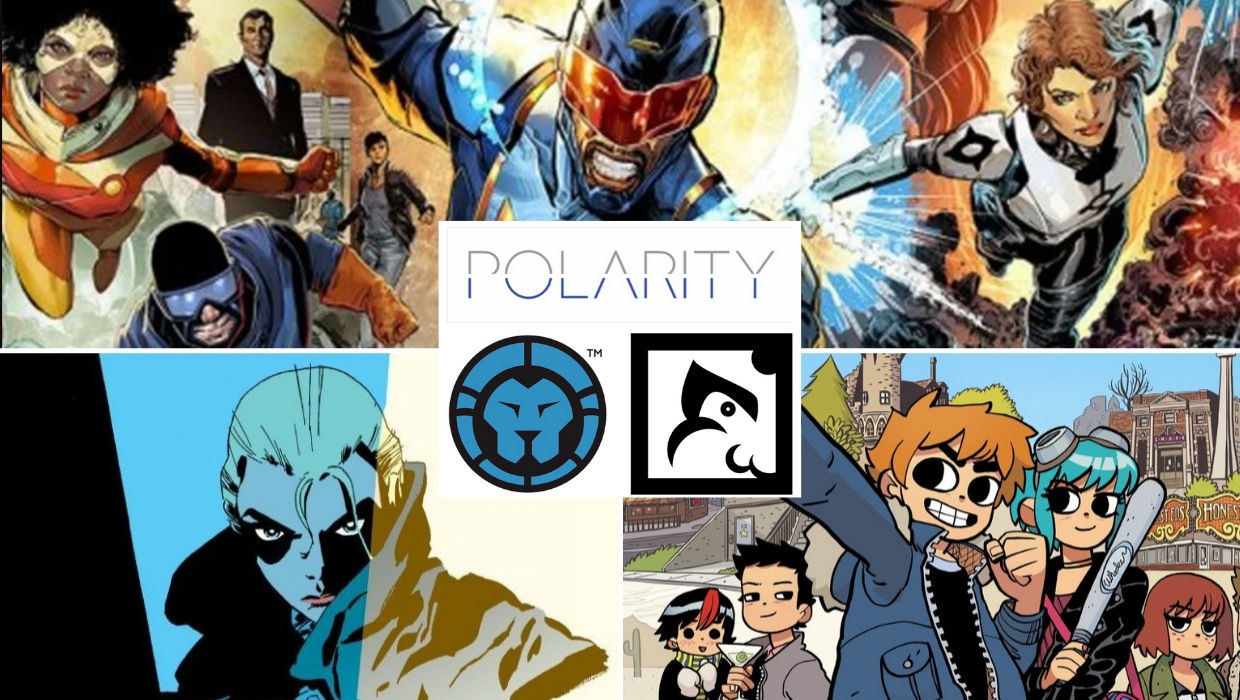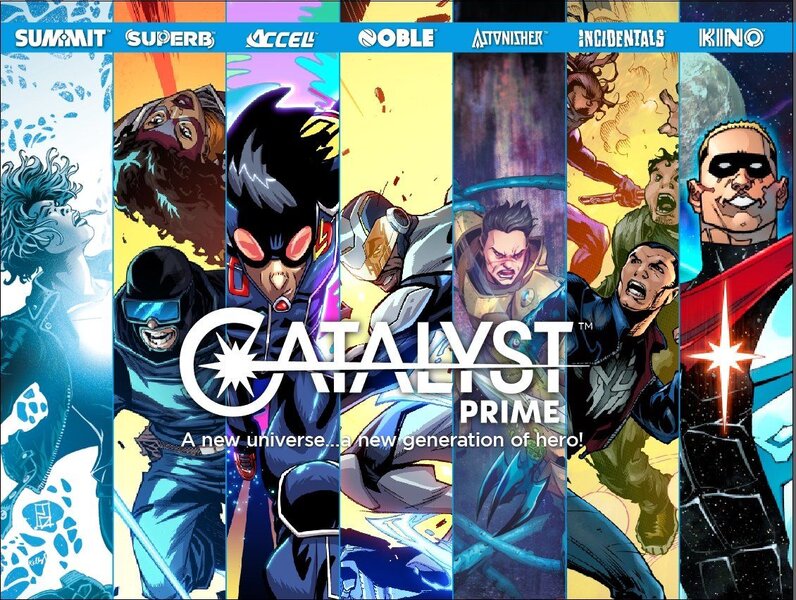Create a free profile to get unlimited access to exclusive videos, sweepstakes, and more!
Lion Forge founders set the record straight on the Oni Press merger and diversity commitment

This week, the indie comic book world was blown away by the announcement that Lion Forge, the St. Louis-based imprint that launched in 2011, has merged with 20-year-old publisher Oni Press under a new parent company called Polarity. Lion Forge got its start with comics based on licensed properties (Care Bears, Voltron: Legendary Defender) and eventually grew to have a robust library of original content for multiple imprints age groups, including the successful Catalyst Prime Universe. Oni Press, meanwhile, has a legacy of multiple Eisners and hit comics, such as Scott Pilgrim and Queen and Country.
With the restructuring come inevitable layoffs, and both companies have already suffered losses, including former Lion Forge Editor-In-Chief Andrea Colvin (Sarah Gaydos now has that title) and Joe Nozemack, co-founder of Oni Press (who has been moved to an "advisory" role). As for the current titles, there will be some changes to the publishing slate of both companies, but those changes are still being determined at this time. (Updated 8 p.m. EST 5/10/19)
Gail Simone, creative director of Catalyst Prime since last year, announced Lion Forge's Seven Days event this week, which means she is safe from the chopping block as well.
However, not everyone is pleased with the new venture, or how it's been handled. Industry pros and fans alike took to social media this week to vocalize their frustrations. Not only were the layoffs swift and seemingly unexpected, but it also seemed as if the majority of those let go are women and people of color. In the current social climate, the optics are not the best, but then again, Lion Forge boasts a higher percentage of women, minorities, and LGBTQ artists, staff, and even characters compared to other profitable indie comics publishers in the industry.
SYFY WIRE spoke with Polarity founder David Steward II and Lion Forge co-founder Carl Reed about the merger, the controversy, and their plans to build an entertainment empire.
Are you going to rename the entire imprint Polarity, or are both Lion Forge and Oni Press going to keep their respective titles?
David Steward II: Polarity is the parent company. Previous to the merger, we announced our new animation studio, Lion Forge Animation, which joins our other companies, Syndicated Comics (owner of The Beat website), our St. Louis ventures, and now the comics division. So, yes, you will still see the Oni imprint moving forward, just as you will see the Lion Forge imprint under this new entity.
When we last spoke, we discussed Lion Forge's unprecedented growth in 2018. Was overexpansion the reason behind the merger?
Steward: We had been in talks with Oni for over a year, and [we realized] we were both going down the same path and inadvertently competing with one another. Given the market size, it just made better sense to work together, since you can make more impact that way. We are very much on the same page in terms of direction, content, and the mission of diversity and inclusion. Our motto is still "Comics for Everyone." We just saw opportunities to do things bigger and better with all the best parts of each company.
Carl Reed: You mentioned unprecedented growth, and a lot of that can be attributed to how nimble we've been in the past. We started out focusing on digital. We realized really fast that we'd have to pivot from that. So we moved to our publishing relationship with IDW. We soon outgrew that. This is just another step in the evolution of furthering our mission and publishing expertise to a broader audience faster and at a higher level.
In 2018 the two of you stepped into the roles of co-executive directors of the Catalyst Prime after Joe Illidge's departure. You also appointed Gail Simone as creative director. Are you each now stepping back from those roles?
Steward: Gail is still in her position, and Carl and I are still overseeing the Catalyst Prime Universe.
Reed: Nothing has changed about that.
Steward: Right. We're also still creating more content as well as going forward.
Can you speak to the sentiment that the layoffs have been mostly women and people of color?
Reed: We're not in a bubble. We have followed this, and this is really the hardest thing for us to see and hear. We can't address it necessarily directly, but we understand this is a hard time. We didn't part with any employees because of performance or a disagreement. This is a tough situation and hard to understand, especially without understanding our internal operations.
The narrative of our entire mission is focused on new perspectives, different voices, and expanding what comics are and who reads them. Not only are we personally comics creators, but we're African-American comics creators. When you're a leader in diversity and you let somebody go, and the majority of your employees are minorities and women, no matter what happens, it can be perceived in a certain way.
Steward: I think a lot of people have read into the situation the wrong way. Our intention is always to guard the best possible outcome in these scenarios. It is so sad for us to have to part ways with folks. But there are things that we have to do, unfortunately, from a business standpoint to make sure that the organization stays healthy and that we're able to continue to keep on our mission going forward.
What does that mean for the freelance creators at Lion Forge and Oni Press that are left? Do all of their contracts have to be renegotiated?
Steward: Some new people will be transferred onto books if there are any editorial changes in the book. But, in most cases, a lot of stuff will stay in the same.
What are your plans for expanding this large well of characters into Lion Forge Animation? Will there be live-action adaptations as well?
Reed: Possibly. We feel we are uniquely positioned to offer content, stories, and representation from a wholly authentic perspective, even down to ownership. Every move that we're making takes that into account. This is not a cash grab, it's coming from a real place of artistry and authenticity.
Who do you consider your competition?
Reed: It kind of depends on what you're looking at. In the direct market, everybody wants to punch above their weight class, right? But if you look at Marvel and DC, they do one thing: superhero comics. What we're looking at is who's competing with us from a content perspective. So maybe then we're looking at Image Comics or Dark Horse. But you also can't leave out the book side of the market where and Scholastic, First Second Books live. As a company, we participate in both, and we want to be best in class for content in general.
Steward: Look at the top 5 or top 10 [indie comic] companies. How do their publishing and their staffing values fit in with what we put on the table? I think we'd be doing a disservice to what we've created over the last nine years if we were not continuing on that mission and merging with like-minded people in that process. What we're doing at Polarity has not really been done before. Not the way that we're trying to do it. You certainly have a lot of conglomerate companies out there, but you know, the integration that we're doing is really a new business paradigm.
















